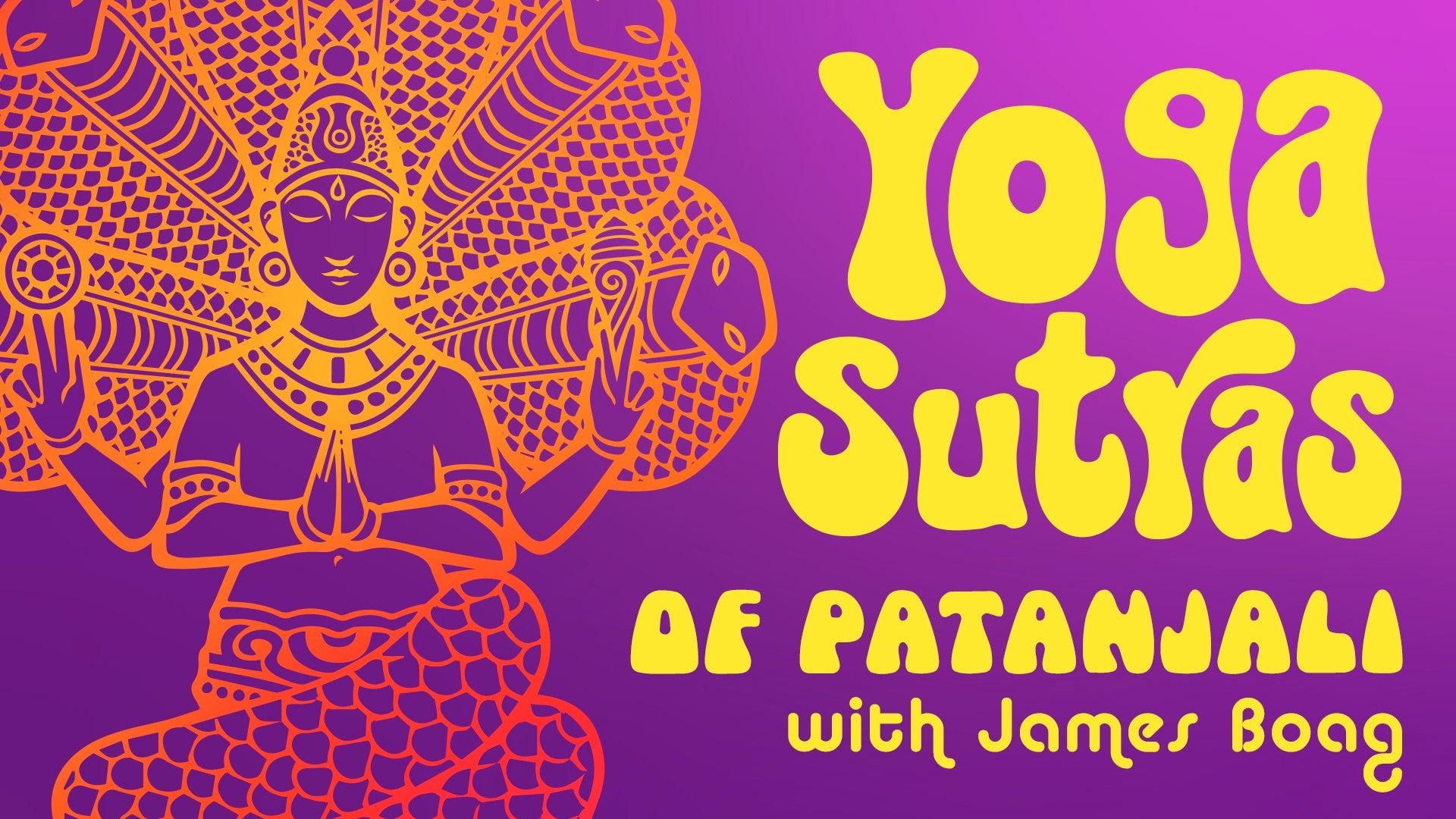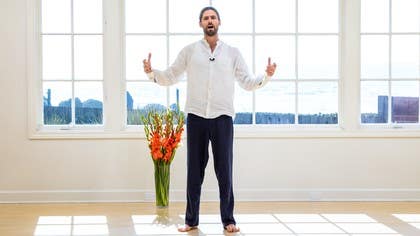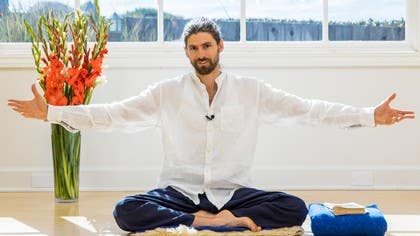Description
About This Video
Transcript
Read Full Transcript
So, during this course, some of the practices that we're going to do are sound practices. And sound practices are very cherished in the yoga tradition, and there are many reasons for this. So in yoga, the idea is to bring all the different parts of which we're constituted into togetherness, into wholeness, into cohesion. And so any yoga technique, the idea is that technique serves to set up a situation in which we can practice being fully present, in which we can train ourselves to be more easily fully present, come what may, whatever situation we find ourselves in. So we do a physical yoga practice, for example, such as yoga asana.
The body serves as the initial lens of focus. We balance in space. But to help ourselves balance in space, we don't just use the bodily powers, we use the sense powers, and we use the mental focus. And maybe we also invite a certain emotional intent. And so that asana practice becomes a way to invite the whole system to feel steady, easy, and wholeheartedly present.
When we use song or recitation, the sounds that we make and sing, they serve as that focal point. And the lovely thing with sound is that it's pervasive and it's penetrative. So if we want to cultivate harmony, when we work with sound, it reaches the parts that other practices don't always reach so easily. And so I find that kirtan and singing practices, they're wonderfully cleansing and wonderfully nourishing because if we give ourselves permission to sound and to sing, it allows this vibration to reach deep into ourselves. They say in the Indian tradition that basically we are constituted of the elements, earth, water, fire, air, and space.
And these elements, they also correspond to our senses. So earth, for example, has fragrance. Maybe we've experienced it, you know, when if it's relatively dry and then the rain comes, it brings out that fragrance from the earth. Water and liquid has taste. Fire being bright is associated with the sense of vision.
The wind or the air, we can feel it, so it's associated with a sense of touch. And that leaves the sense of hearing and sound. And last century, the quantum physicists came to a conclusion that had already been recognized by yogic researchers millennia ago that this space in which we exist is not just empty, it is full of vibration. And so the idea is if we want to harmonize our vibration, why not go straight to sound? Because once we work with sound, we can work on all those elements.
If for example, you go out into a dusty city center, when you get home, you might want to take recourse to the element of water and wash the earth from your body. If you have water and you're not sure if it's clean and you want to drink it, you might wash or clean the element of water by heating it with the element of fire. And if you want to take away the fire, the element of air can take it away. But if you want to clean all the elements, why not work with sound? And so we're going to include sound-based practices throughout this course.
And these songs and sound-based practices are sometimes referred to as kirtan or kirtanam. And this comes from a Sanskrit word kirti, which means glory. And kirtan or kirtanam, glorification. Kirt as a verb also means to tell, it's to tell the glory of something. So one beautiful idea in yoga is basically, is it not a glorious thing to be alive?
Sometimes life can feel kind of heavy. But if we stop and consider the miracle that allows us just to experience anything at all, it really is quite a glorious thing. Just to move our hand in space, just to climb a flight of stairs, just to open and draw, so much miraculous intelligence at play, to speak, to communicate. So it really is a glorious thing to be incarnate in a human body. And the idea in yoga is that when we practice bringing all of these miraculous powers with which we're endowed as a human being together, it can allow us to have a glorious experience right here and right now.
So maybe you've experienced, you know, if you're doing something and you really get into it, so your mind, your speech, and your action are one, it feels great. As this Subashita, it means like a proverb or a wise saying in Sanskrit, and it says, manasyekam vachasyekam karmanyekam mahatmana, manasyanyat vachasyanyat karmanyanyattaratmana. And so it says, a person whose manaha, whose mind, vachaha, speech, and karma, action are one, such a person is a mahatmana, mahatmana, is a great soul. But a person whose mind is in one place, whose speech is saying something else, whose action is doing something else again, that is a soul, duraatmana, it's a soul in difficulty, it's a soul in torment. And I think this is true, yeah.
When we feel cohesive and we're really into something, we're doing it with every part of our self wholeheartedly, the action becomes its own reward, it's a glorious experience, even if it's a relatively mundane thing. Cleaning the floor could become kirtan if you give yourself holy to it. Everybody's life involves some mundane tasks, but if when you're cleaning the floor, you're really noticing the miraculous power that allows you to apply just enough pressure to clean the floor, then it becomes like a practice, it becomes a way to train our self so we can actually allow our self to savour the fullness of each moment. And so kirtan practice is a really lovely way to train our selves to be wholeheartedly in the present moment, because when we sing, it very readily recruits all the different parts of our self, because singing obviously is a physical act and it's an energetic act, but we have to focus on the sound so it recruits the mind, it recruits our sense body if you like, and we do it with emotion and intent. So very readily in kirtan practice, the body, the senses, the mind, the emotions, they all get invited into the practice.
So it's a lovely way to train ourselves in the way of yoga, which basically means inviting all of our self into whatever we are doing, because it's important to remember that yoga technique is not about the technique, it's preparing us for the rest of the day. So when we sing a kirtan song, we give ourselves to the song, we allow ourselves to be fully in it, we give ourselves permission to be fully in it, it becomes its own reward, but that practice also accustoms us to some degree of to being fully in whatever we are doing. And so if we find ourselves splitting into fragmentation, it doesn't feel so good. And because of the reference of cohesion that we had in the practice, we might notice that more quickly and catch ourselves and think, what's going on here? This doesn't feel so glorious.
Is there something I can do about that? Where am I in this? And so kirtan, as well as being a very cleansing, soothing practice, it's also quite a powerful practice to train ourselves in the ways of cohesion. Now one other thing that's important to mention about the singing practice is that so many of us in our lives have had experiences that can make us feel a little bit reluctant to sing, to open the voice and open the heart to sing. And I've experienced many times people come to kirtan and they were told when they were a child that they couldn't sing.
They were thrown out of the choir. I had a lady in a kirtan recently and she said at the beginning, well, my husband's a singing teacher. When I met him, he said, I can teach anybody to sing. But after we were married eight months, he said, there is an exception. But she gave herself permission to come to the kirtan and she really enjoyed it.
And so many times I've had experiences like this. People are a little bit hesitant, but they allow themselves to sing and it becomes its own reward. So my invitation with all of the sound based practices, some of the videos, it'll just be the song and there'll be a reference of the printed words if you'd like to follow along with them or you can just get to know the words. Some invitations just sing wholeheartedly. Let the song be an opportunity to deepen into that yogic way, that way of doing something with every part of yourself so the action becomes its own reward.
Yoga Sutras of Patanjali: Start Where You Are
Comments
You need to be a subscriber to post a comment.
Please Log In or Create an Account to start your free trial.











